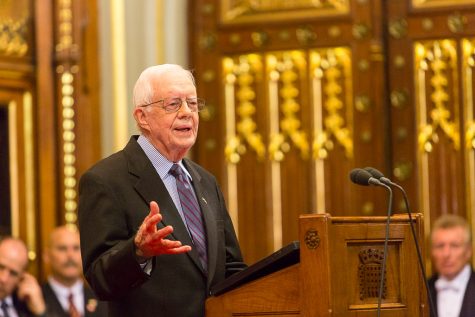Canada is second nation to legalize marijuana
Canada’s federal Cannabis Act, also known as Bill C-45, went into effect on Wednesday, Oct. 17, effectively legalizing marijuana for recreational use throughout the nation. The only other country to have passed similar legislation is Uruguay, where recreational marijuana has been legal since Dec. 2013.
On the day of the bill’s implementation, Prime Minister Justin Trudeau took to Twitter to voice his approval. “Profits out of the hands of criminals. Protection for our kids. Today #cannabis is legalized and regulated across Canada,” he tweeted. The bill marks a victory for Trudeau, who committed to legalization efforts while he was campaigning during Canada’s 2015 federal election.
The bill allows adults to purchase and carry up to 30g of dried cannabis at once in a public space, which includes personal vehicles. However, the Canadian government anticipates a two- to three-month transition period before cannabis retailers become accessible across the entire country.
Cannabis had previously been illegal in Canada since 1923, but the usage of the drug was minimal until the late 1960s. The Royal Canadian Mounted Police recorded only 25 cannabis-related arrests from 1930 to 1946, but that number rose to 2,300 by 1968 and 12,000 by 1972.
Dr. Leonard Jason is a professor of psychology at DePaul and specializes in community psychology and drug use. According to Dr. Jason, the recent changes in Canada’s marijuana legislation were jump-started by a growing acknowledgment of the flaws in the country’s justice system.
“Canada’s legal justice system, similar to America’s, has been highly populated with minor criminal offenders possessing marginal amounts of cannabis,” Dr. Jason said. “The liberal parliament members in Canada have been critical of the drug policies that were in effect in relation to marijuana, arguing that the larger problem was the illegal drug trade and associated illicit activities that capitalized on marijuana being an illegal substance.”
Before the Cannabis Act, the only notable change that was made to Canada’s marijuana legislation was in 2001 when medical marijuana was legalized nationally under Prime Minister Jean Chrétien. In recent years, though, public opinion regarding marijuana legalization in Canada has become increasingly favorable. Nanos Research, a Canadian polling, and public opinion organization conducted a poll in 2016 that showed 7 in 10 Canadians support marijuana legalization.
DePaul senior Liz Sutherland, who was born and raised in Toronto, thinks that the legalization of recreational marijuana will be beneficial in the long run.
“I think the legalization of marijuana will improve our economy and help to reduce crime rates,” Sutherland said. “I think the control and management of it will be incredibly difficult but if the government and citizens stay diligent and on top of things it will be great for us.”
Though support for legalization is substantial, another poll conducted by Nanos Research this year reports that many Canadians have some reservations about the drug, specifically regarding people driving or working under the influence of marijuana and the possible negative effects the drug may have on youth. The study also shows that the majority of Canadians agree that schools should play a role in educating youth about marijuana.
Dr. Jason said that one of the biggest concerns surrounding recreational marijuana is its effects on one’s mental health.
“A number of factors, including mental and physical health issues can lead to a greater chance of marijuana misuse,” Dr. Jason said. “Rightly so, many concerns have been raised about marijuana’s adverse effect on youth cognitive development. There are many studies that point to developmental difficulties and increased rates of bipolar, schizophrenia, and psychosis in adolescent and young adult marijuana users. Appropriate warnings must be developed for marijuana now that it is legalized.”
As for additional effects of legalization, Dr. Jason said the nation should expect a boost in its economy.
“Canada should experience a large boom economically in the short-term of marijuana legalization, which has been the case with the states in the U.S. that have legalized the drug,” Dr. Jason said. “With the creation of this new legalized industry, there should also be a surge in new employment opportunities. In terms of long-term projections, this is harder to predict. Some experts in Canada expect a long-term boom in the economy, while others project that there may be an oversupply of marijuana if the drug ends up being viewed negatively on a societal level.”
Since Canada legalized marijuana, many have thought that their decision might influence the U.S. to pass similar legislation. However, Dr. Jason is hesitant to believe that the U.S. will quickly follow suit.
“I would not be too quick to think that America would also nationally legalize marijuana,” Dr. Jason said. “The liberal recreational use attitudes in America do not closely mirror the attitudes in Canada. A majority of legislators in America do not support marijuana legalization, and when they do it is mostly for medical purposes.”












